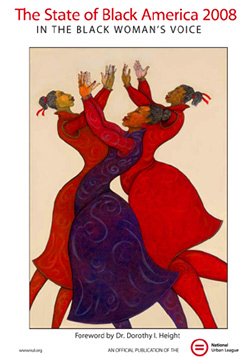
WASHINGTON (Finalcall.com) – Last year the National Urban League looked at the State of Black America (SOBA) through the lens of men. It was a picture filled with “grim prospects” as NUL President Marc Morial explained.
This year, it’s the women, “They are our mothers, grandmothers, aunts, sisters, daughters and wives. This year the 2008 SOBA looks through the eyes of women,” said Mr. Morial.
“Last year we reported Black America was at a tipping point. This year we tread water because when we look over the horizons we see storm clouds and thunder storms, great difficulties and challenges lie ahead,” he said at a March 5 press conference.
The report’s essays reveal the good, the bad and the mostly ugly life of being Black and female in America. Black women from Dr. Dorothy Height of the National Council of Negro Women to Dr. Johnnetta B. Cole, former president of Spelman and Bennett Colleges for women, Alexis Herman, former secretary of Labor, to Lisa Mensah, executive director of the Aspen Institute’s Initiative on Financial Security, tell the story in facts and figures.
The book’s essays range from political disenfranchisement, to the glass ceiling in career advancement to the importance of early childhood education to health and civil rights.
Marcia Dickson faces the “Third Burden.” She’s a Black single mom with two children. She has an “OK” job in her words, but she wants more.
“I want the American dream, a husband, a two car garage and a home in the suburbs. It’s just hard and as hard as it is for me, it’s even harder for my children’s father,” she told The Final Call.
Julianne Malveaux, Ph.D., president of Bennett College for Women explains, “Shouldering the Third Burden” is “an oppression that is a function of the majority society’s marginalization and demonization of African American men.”
She writes, “Black men and women both experience higher unemployment rates than the general population. However, the unemployment and underemployment of Black men shifts a disproportionate economic responsibility onto the shoulders of African American women, who then must support households and children without sufficient contribution from spouses, partners or fathers.”
Susan Taylor, former editorial director of Essence offered guidance to Black women, saying, “Whether it was love or lust in the moments we come together and make a life, there is usually something tender afoot between us. How do we call that back, pull it out of the bedroom and into the living room of our life? What do we win when we set aside cruel words–and cruel hands? African Americans are the most unwed people in the nation.”
“We need marriages of true minds. Partnerships are our strength, the glue that holds families and communities together,” she said.
Another poison choking the life out of Black women is the sub prime mortgage crisis. While it has White America wringing its hands, the real and substantial loser of wealth is the Black community. According to a United for A Fair Economy report “State of the Dream 2008: Foreclosed,” Blacks will lose $71 billion to $122 billion from sub prime loans taken out over the past eight years. “Considering that over half of all loans made to Black borrowers in 2005 and 2006 were sub prime, and that African American women account for 48.8 percent of all African American sub prime borrowers in 2006, it is easy to imagine the devastation that is headed toward Black women and their communities,” wrote Andrea Harris, president of the North Carolina Institute for Minority Economic Development.
“The National Urban League hopes that by presenting issues facing Black women–and all African Americans–through the lens and voices of Black women, we offer a helpful collage of perspective, assessments and opinions that reflect the diversity, intelligence and depth of Black women in all walks of American life,” said Stephanie J. Jones, J.D., of the Urban League’s Policy Institute.












